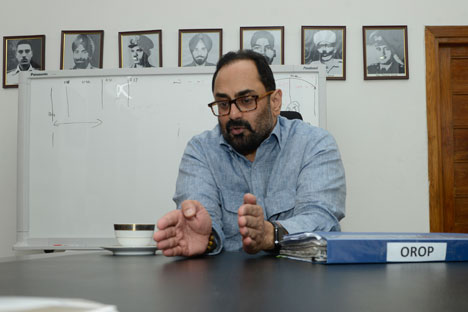
Chandigarh: Rich Punjabis go to the US and Canada; the poor have to be content with the Gulf.
Take, for instance, Sukhwinder Singh. "I went with a contract of Rs 48,000 a month. This was a lot of money for me," said the resident of Janta Nagar near Mohali.
Singh had left for Basra, Iraq, in May 2014. He returned home a month and a half later and has since then been doing odd jobs.
"These days I get work for Rs 500-Rs 600 a day and that does not happen every day," the elderly construction worker told this paper.
So what had driven the 55-year-old father of three to the Gulf?
Grinding poverty, according to Aam Aadmi Party MP Bhagwant Mann, especially in the Majha region that comprises Amritsar, Gurdaspur and Tarn Taran.
"The US and Canada are for the rich. The poor from Punjab have no choice but to go to the Gulf countries. Agents show them dreams that would change their lives and these people fall for it," Mann said on Wednesday, a day after 39 Indians missing in Mosul, Iraq, since June 2014 were declared dead.
Lack of jobs also played a part. The employment rate in Punjab is 16.6 per cent among 18-29-year-olds. The state also has the eighth-highest rural unemployment rate in the country. According to the Punjab economic survey tabled last year, the number of job seekers till December 2016 was 3.18 lakh.
The Congress last year rode to power on the growing anger against the then ruling Akali Dal-BJP combine with the promise of "Ghar Ghar Rozgar" (employment for every household).
In the run-up to the elections, the Congress had received applications from 13.24 lakh people. Chief minister Amarinder Singh assumed charge on March 16, 2017, and since then 1.35 lakh placements have taken place directly or indirectly through the government.
Amarinder claims the figure is around 1.61 lakh, after taking into account jobs offered through skill-development and self-employment schemes.
Mann, who has been working behind the scenes for many of those from Punjab stuck in the Gulf, said these people were duped and treated like slaves. "The contractors snatch their passports and they cannot return home," he said.
Jagatpreet Singh, a villager in Dhandor, Jalandhar, who fled from Najaf in 2014, echoed the MP. "Our passports were snatched, we were forced to work 30 hours at a stretch and denied payments if we wanted to return. Plus, there was the threat from the terrorists," Jagatpreet, who worked at a construction site, said over the phone.
The lone survivor of the Mosul massacre, Harjit Masih, said most people went to Iraq because the pay was higher than in other countries in the region.
"In Dubai a worker can get a starting salary of Rs 15,000 a month. In Iraq the pay starts from Rs 25,000. Only that we were not told about the dangers involved," he said.











